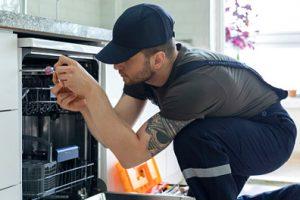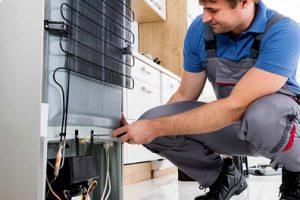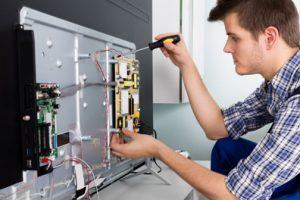Refrigerators are essential appliances in our homes, keeping our food fresh and beverages cold. However, sometimes they can develop issues that lead to frustration. One common problem is a refrigerator freezing up. If you’ve ever opened your fridge to find your vegetables turned into ice or your milk frozen solid, you know how inconvenient this can be. Understanding the causes of this issue can help you prevent it and keep your refrigerator running smoothly.
1. Faulty Thermostat
A common cause of a refrigerator freezing up is a faulty thermostat. The thermostat regulates the temperature inside the refrigerator. When it malfunctions, it can cause the fridge to become too cold, resulting in frozen food.
Symptoms of a Faulty Thermostat:
- Food and drinks are colder than usual or frozen.
- The refrigerator runs continuously without cycling off.
- The thermostat setting does not correspond to the actual temperature inside the fridge.
Solutions:
- Check the Thermostat Setting: Ensure it is set to the manufacturer’s recommended temperature, usually between 37°F and 40°F for the refrigerator and 0°F for the freezer.
- Replace the Thermostat: If the thermostat is faulty, replacing it may be necessary. This task can be done by a professional or as a DIY project if you are comfortable with appliance repairs.
A well-functioning thermostat is crucial to prevent a refrigerator freezing up. Regularly checking and maintaining it can save you from the hassle of frozen groceries.
2. Blocked Air Vents
Air circulation is vital for maintaining an even temperature throughout your refrigerator. When air vents are blocked, cold air can become trapped in one area, leading to freezing.
Causes of Blocked Air Vents:
- Overpacking the Fridge: Placing too many items in the refrigerator can block the vents, restricting airflow.
- Improper Arrangement: Large items placed in front of vents can obstruct the flow of cold air.
Solutions:
- Proper Organization: Arrange items in your refrigerator to allow for adequate air circulation. Avoid placing large containers directly in front of the vents.
- Regular Cleaning: Periodically check and clean the vents to ensure they are free from obstructions like food debris or ice buildup.
Ensuring proper airflow can significantly reduce the risk of your refrigerator freezing up. Keeping vents clear and organizing your fridge efficiently are simple yet effective ways to prevent this issue.
3. Damaged Door Seals

The door seals, also known as gaskets, play a crucial role in maintaining the temperature inside your refrigerator. If these seals are damaged, warm air can enter the fridge, causing the compressor to overwork and potentially leading to freezing.
Signs of Damaged Door Seals:
- The refrigerator door does not close properly.
- Condensation or frost buildup around the door edges.
- The door seal appears cracked, torn, or worn out.
Solutions:
- Inspect and Clean: Regularly inspect the door seals for damage. Clean them with mild soap and water to remove any dirt or debris that may prevent a proper seal.
- Replace if Necessary: If the seals are damaged beyond cleaning or repair, replace them. Door seals are usually available from the refrigerator manufacturer or appliance parts stores.
Maintaining door seals in good condition is essential for preventing a refrigerator freezing up. Regular checks and prompt replacements can help keep your fridge running efficiently.
4. Incorrect Temperature Settings
Sometimes, the cause of a refrigerator freezing up is as simple as incorrect temperature settings. Setting the thermostat too low can lead to freezing issues.
Common Mistakes:
- Setting the refrigerator temperature too close to 32°F, the freezing point of water.
- Misinterpreting the temperature dial, especially in models with numeric settings rather than specific temperature indicators.
Solutions:
- Follow Manufacturer Guidelines: Refer to the user manual for the recommended temperature settings for your refrigerator.
- Use a Thermometer: Place a refrigerator thermometer inside to monitor the actual temperature and adjust the settings accordingly.
Proper temperature settings are key to preventing a refrigerator from freezing up. Ensuring your fridge is set to the correct temperature can help maintain the ideal environment for your food.
5. Faulty Defrost System
Modern refrigerators are equipped with a defrost system to prevent ice buildup. When this system fails, it can cause the refrigerator to freeze up.
Components of the Defrost System:
- Defrost Timer: Cycles the defrost heater on and off.
- Defrost Heater: Melts any frost or ice that has accumulated.
- Defrost Thermostat: Monitors the temperature and controls the heater.
Signs of a Faulty Defrost System:
- Ice buildup in the freezer or refrigerator compartment.
- The fridge runs continuously without defrosting.
- Water leakage inside the refrigerator.
Solutions:
- Check Components: Inspect the defrost timer, heater, and thermostat for any signs of malfunction.
- Replace Faulty Parts: If any component of the defrost system is not working correctly, it may need to be replaced. This can often be done with the help of a professional appliance repair technician.
Maintaining the defrost system in good working order is essential to prevent a refrigerator freezing up. Regular inspections and timely repairs can help avoid ice buildup and keep your fridge functioning efficiently.
6. Malfunctioning Control Board
The control board is the brain of your refrigerator, regulating its various functions. If the control board malfunctions, it can cause issues like a refrigerator freezing up.
Indicators of a Malfunctioning Control Board:
- Erratic temperature fluctuations.
- The refrigerator does not respond to temperature adjustments.
- Unusual noises or failure to operate properly.
Solutions:
- Reset the Control Board: Sometimes, a simple reset can fix minor issues. Refer to the user manual for instructions on how to reset the control board.
- Professional Diagnosis: If resetting does not help, it may be necessary to have the control board diagnosed and replaced by a professional.
Ensuring the control board functions correctly is crucial for preventing a refrigerator freezing up. Regular maintenance and prompt repairs can help keep your fridge in optimal condition.
7. Overfilled Refrigerator
While it might seem convenient to stock up your refrigerator, overfilling it can lead to various issues, including freezing.
Problems Caused by Overfilling:
- Blocked air vents restricting airflow.
- Overworked compressor trying to maintain the temperature.
- Uneven temperature distribution leading to cold spots.
Solutions:
- Organize Smartly: Arrange items to allow proper airflow. Avoid placing large items directly in front of vents.
- Maintain Balance: Keep the refrigerator moderately filled. Too many items can obstruct air circulation, while too few can make the appliance work harder to maintain the temperature.
Managing the contents of your refrigerator effectively can prevent it from freezing up. Ensuring adequate space for air circulation is key to maintaining an even temperature.
8. Refrigerant Issues
Refrigerants play a crucial role in cooling your refrigerator. A leak or low levels of refrigerant can cause the system to malfunction, leading to freezing.
Signs of Refrigerant Issues:
- The refrigerator is not cooling properly or is excessively cold.
- Hissing or bubbling noises indicating a refrigerant leak.
- Ice buildup on the evaporator coils.
Solutions:
- Check for Leaks: Inspect the refrigerator for any signs of refrigerant leaks. This is usually best done by a professional.
- Recharge Refrigerant: If refrigerant levels are low, a professional can recharge the system to the correct levels.
Addressing refrigerant issues promptly is essential to prevent a refrigerator freezing up. Regular maintenance and professional checks can help keep the cooling system in good condition.
9. Evaporator Fan Problems
The evaporator fan helps circulate air throughout the refrigerator. If this fan stops working, it can cause uneven cooling and lead to freezing in certain areas.
Symptoms of Evaporator Fan Problems:
- Unusual noises coming from the refrigerator.
- Inconsistent temperatures inside the fridge.
- Frost buildup on the evaporator coils.
Solutions:
- Inspect the Fan: Check the fan for any obstructions or damage.
- Replace if Necessary: If the fan is malfunctioning, replacing it can restore proper air circulation.
Maintaining the evaporator fan in good working order is crucial to prevent a refrigerator freezing up. Regular inspections and timely replacements can help ensure your fridge operates smoothly.
10. External Temperature Fluctuations

Environmental factors, such as the room temperature where the refrigerator is located, can also affect its performance. Extreme temperatures, whether too hot or too cold, can cause a refrigerator to freeze up.
Impact of External Temperatures:
- Hot Environments: In a hot room, the refrigerator may overcompensate to keep cool, leading to freezing.
- Cold Environments: In colder rooms, especially unheated garages, the fridge may not cycle properly, causing freezing issues.
Solutions:
- Location: Place the refrigerator in a well-ventilated area with a stable temperature.
- Insulation: In cold environments, consider insulating the refrigerator to help it maintain a consistent temperature.
Managing the external environment where your refrigerator is located can help prevent it from freezing up. Ensuring a stable room temperature is crucial for optimal performance.
Conclusion
A refrigerator freezing up can be a frustrating issue, but understanding the common causes can help you prevent it. From faulty thermostats and blocked air vents to refrigerant issues and external temperature fluctuations, many factors can contribute to this problem. Regular maintenance, proper organization, and timely repairs are key to keeping your refrigerator running smoothly. If you experience persistent issues, don’t hesitate to contact a professional for assistance. Remember, maintaining your refrigerator in good condition not only prevents freezing problems but also extends its lifespan and improves its efficiency.
For expert assistance and repairs, contact us at 0567750003. Our team is ready to help you resolve any refrigerator issues and ensure your appliance operates at its best.







